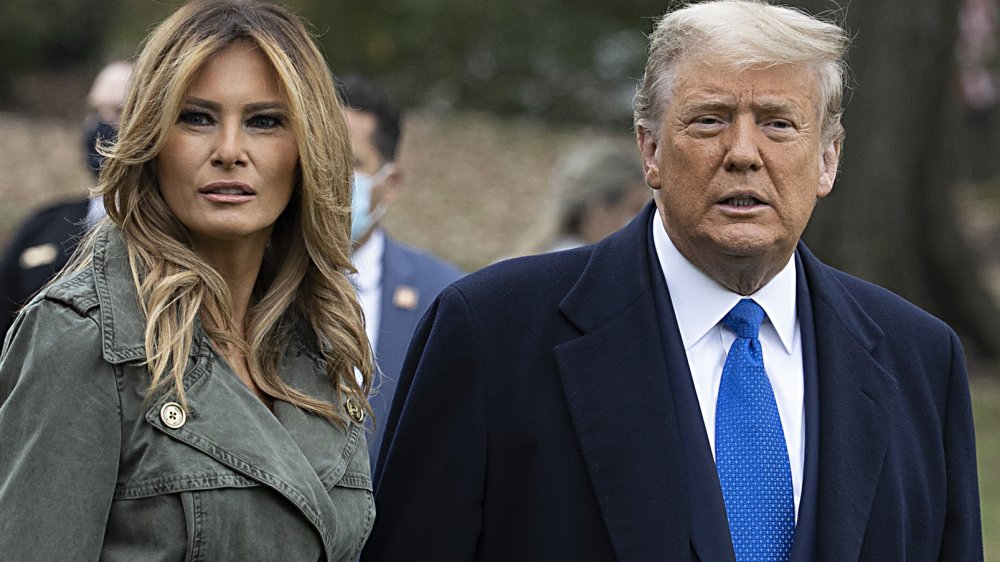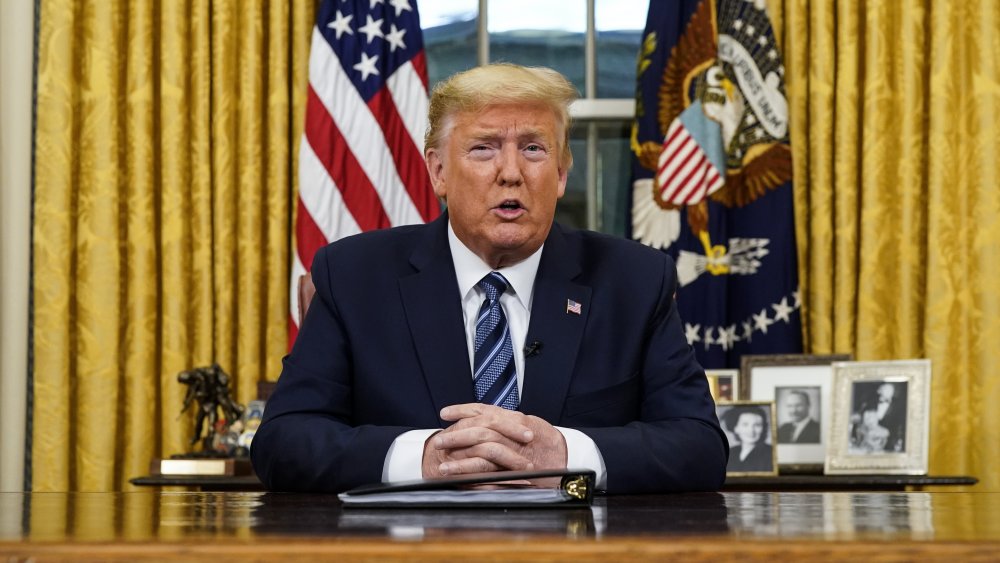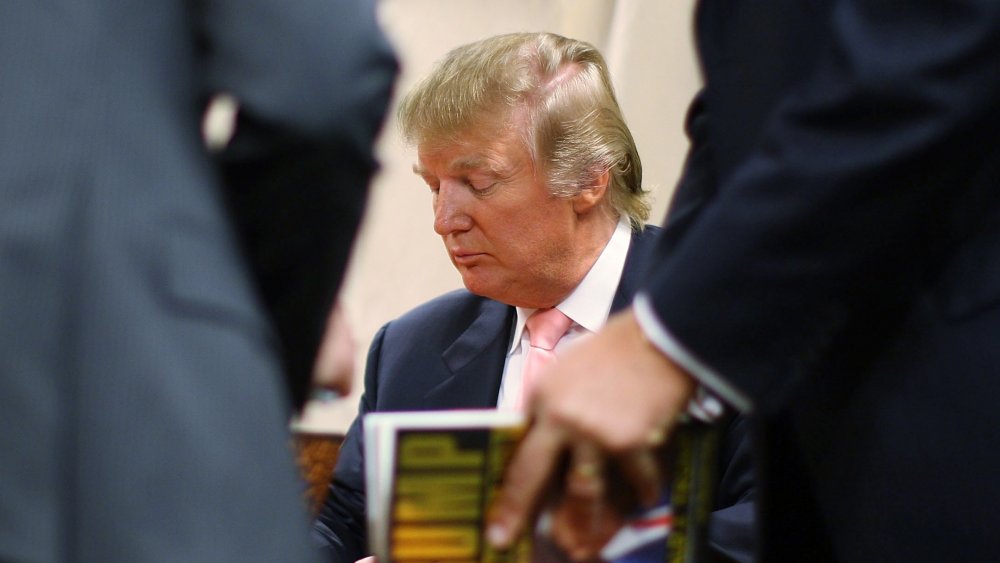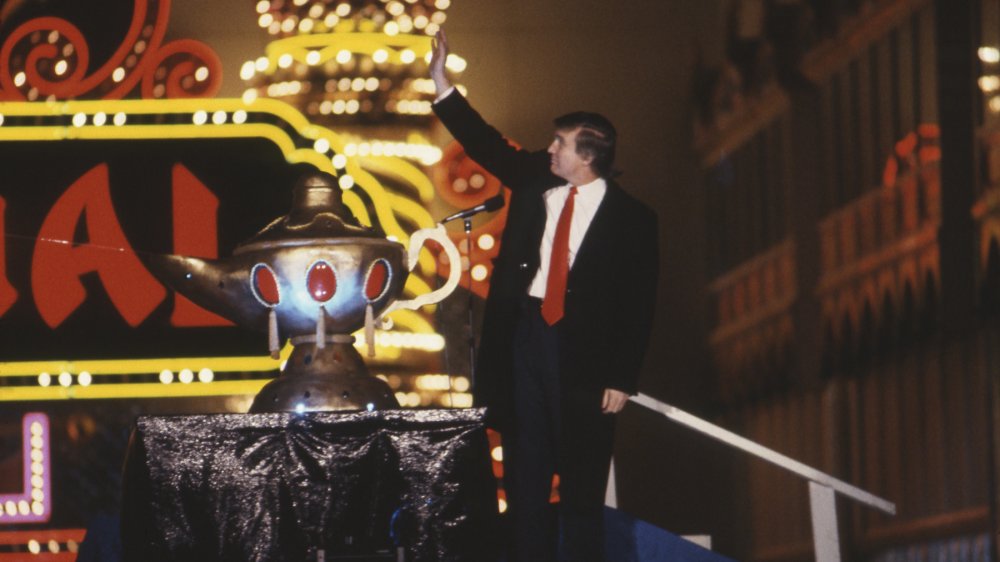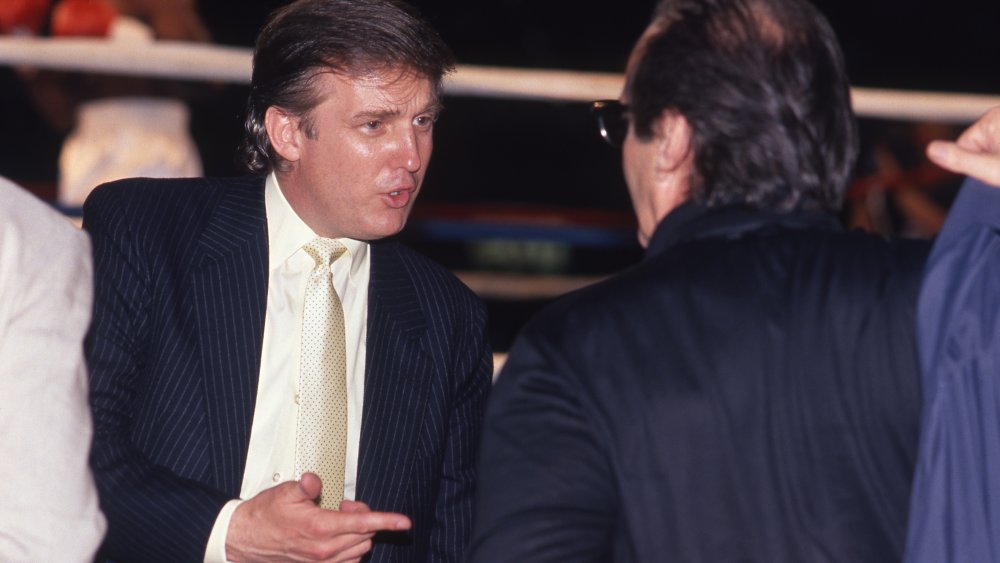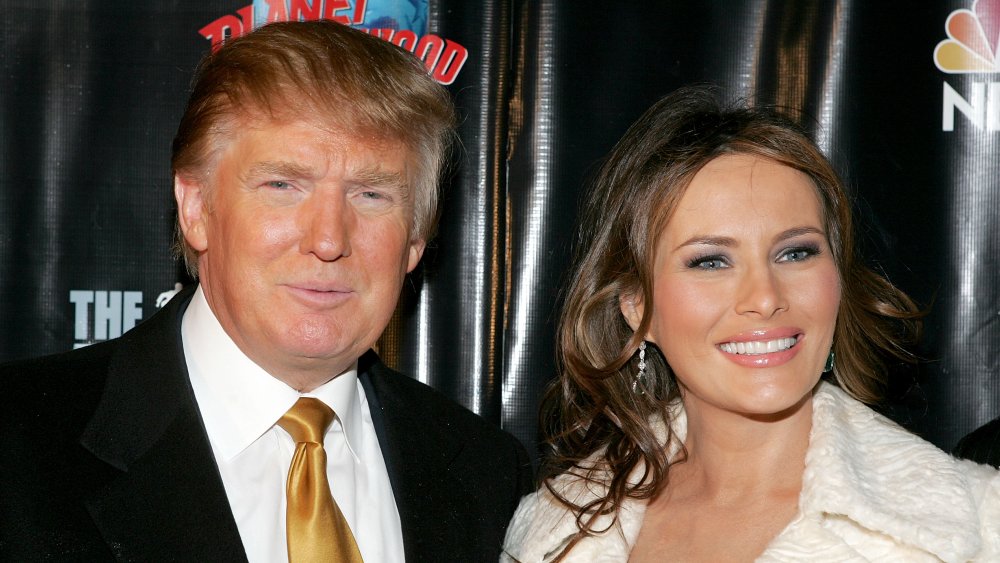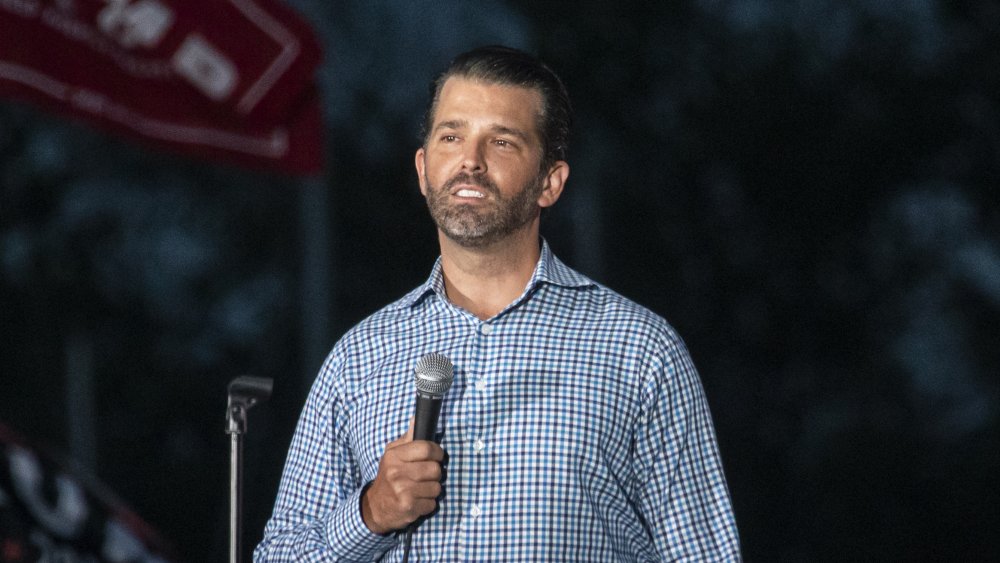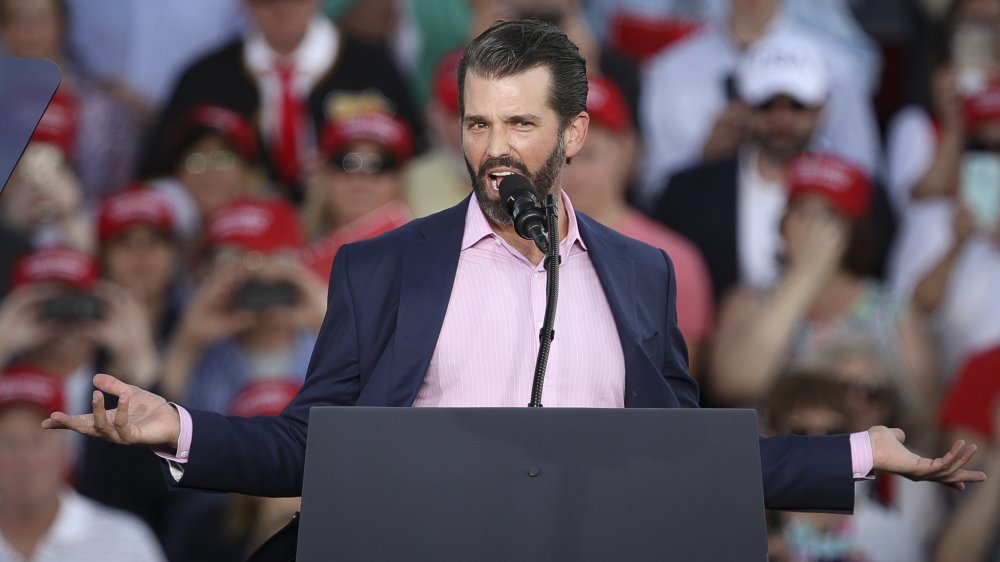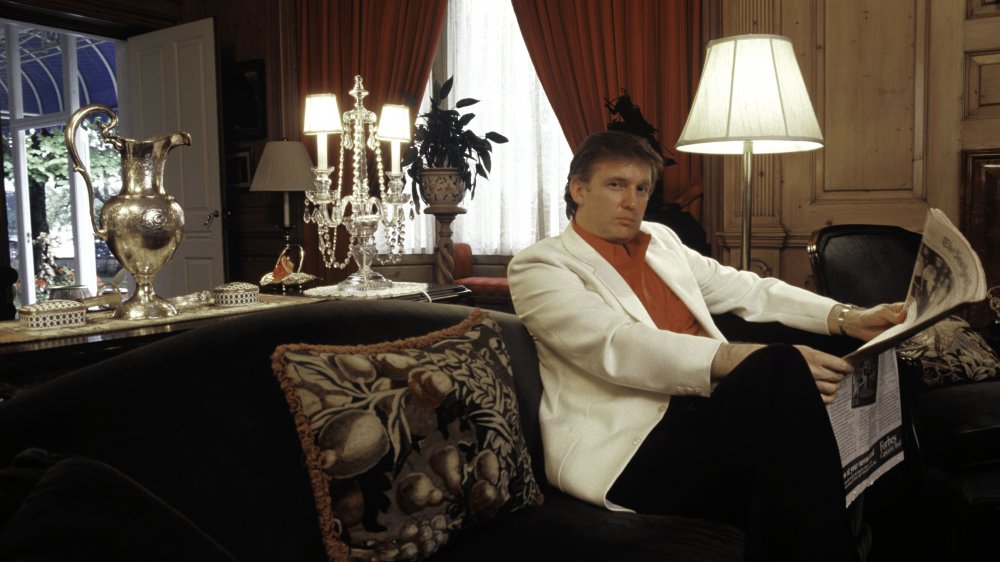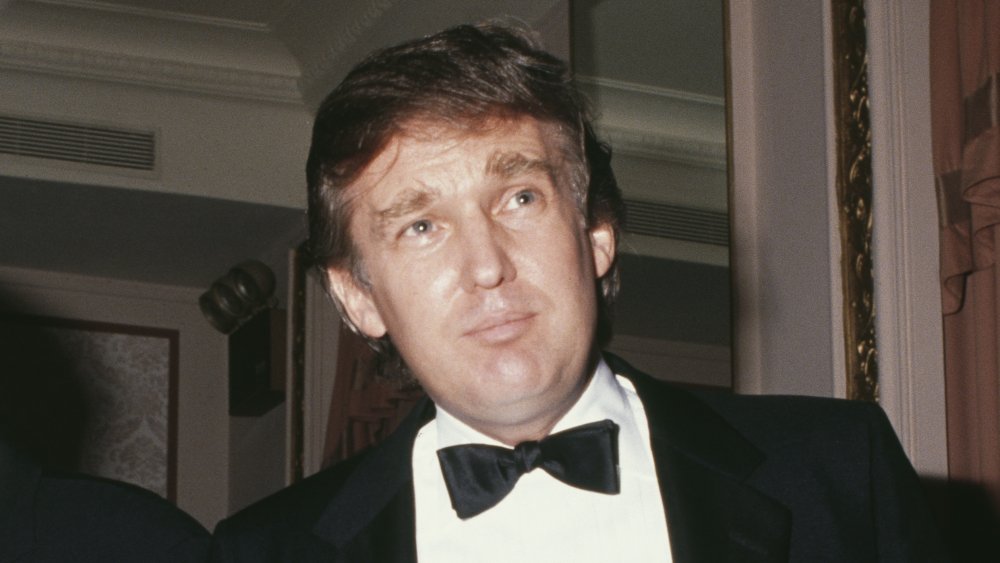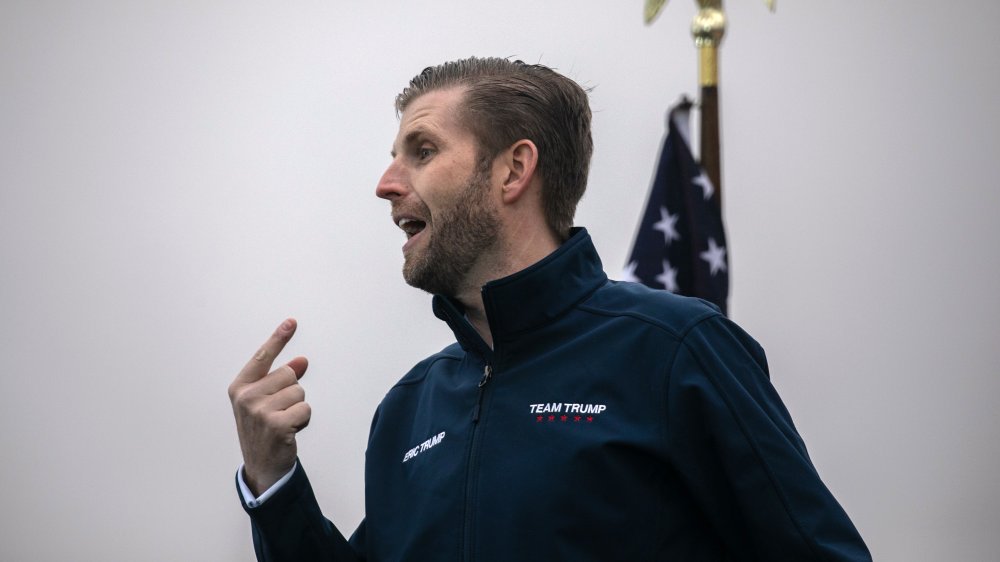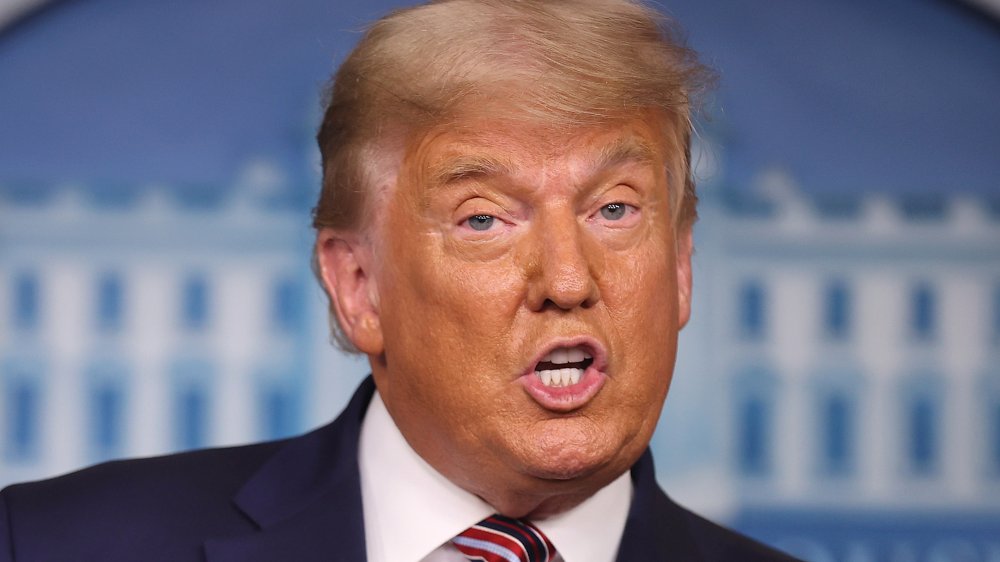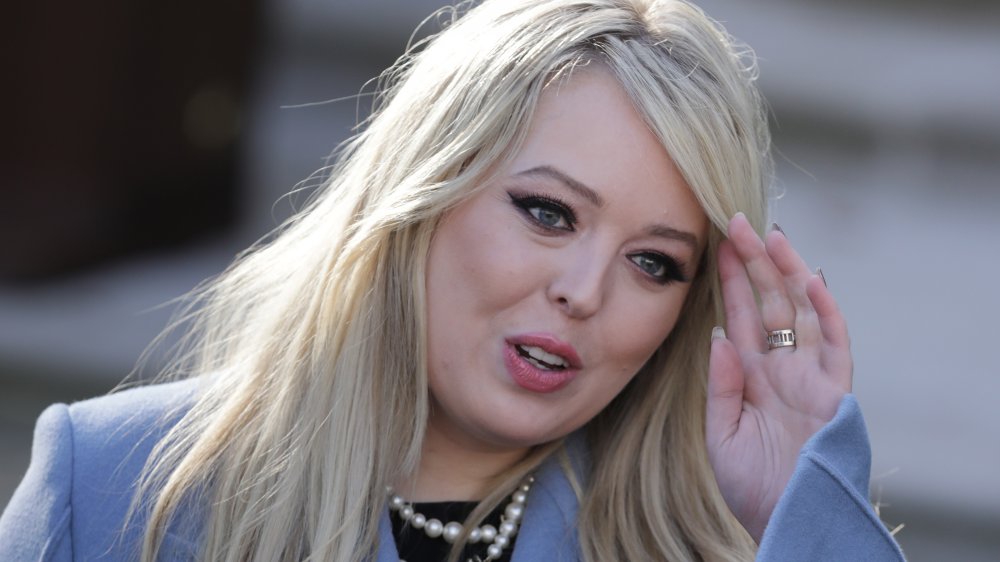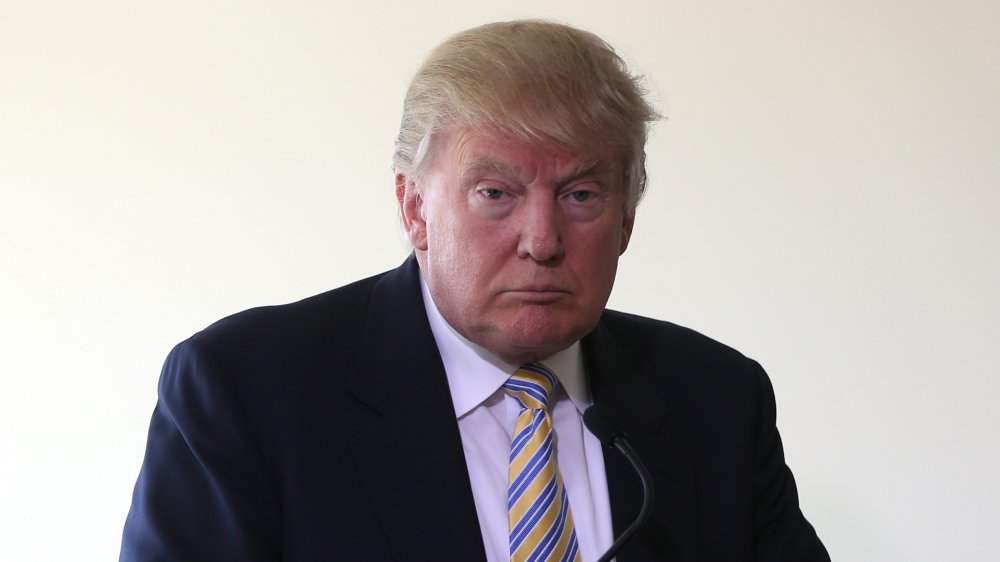The Trump Family Isn't Worth As Much As You Think
If there is one name synonymous with wealth, lavish lifestyles, and hotel properties, it's Trump. For decades, Donald Trump projected his name onto casinos and golf courses, and, in doing so, he secured the reputation of a businessman and billionaire.
Donald Trump's reality competition show, The Apprentice, continued to bolster the idea that he was sitting on billions of dollars — after all, the theme song of the show was literally called "For the Love of Money" by The O'Jays. By the time Donald announced his candidacy for president, he hinged his campaign on the idea that the United States needed to be run like a business (via The Washington Post).
But once he assumed office, Donald became the subject of intense scrutiny over his finances. Unlike most presidents who had come before him, Trump refused to release his tax returns, according to the Associated Press, and many speculated there could be conflicts of interest in regards to his properties. To top it off, investigators at newspapers like The New York Times all but debunked Donald's claims that he is a self-made billionaire. And with Donald now a one-term president, his finances could once again be back in the spotlight. So here's all you need to know about the family's financial standing — because the Trumps probably aren't worth as much as you think.
How Donald Trump has reportedly avoided paying taxes for years
Due to the work of journalists at The New York Times, it appears Donald Trump has been hiding a lot in his taxes. The Times reported that in 1985, "Trump reported losses of $46.1 million from his core businesses," noting, "They continued to lose money every year, totaling $1.17 billion in losses for the decade." The Times also concluded that Donald seemed to have "lost more money than nearly any other individual American taxpayer."
By reporting more financial losses than gains, Trump reportedly avoided paying income tax for years, something that he has bragged about. "I fight very hard to pay as little tax as possible," he told ABC News. When asked what his tax rate was, Trump said, "It's none of your business." After digging into Trump's taxes, The New York Times concluded that Donald Trump had paid only $750 in federal income taxes in the year he won the White House and paid another $750 in his first year as president.
"He had paid no income taxes at all in 10 of the previous 15 years," The Times reported, "largely because he reported losing much more money than he made."
Running into financial difficulties, Donald Trump apparently borrowed millions from his inheritance
We'd be lying if we said that we never ran to our parents for a $20 bill or asked for a check at Christmas instead of another set of fuzzy socks, but this takes the cake. When Donald Trump was expanding his real estate career, he reportedly borrowed money from his father and his future inheritance. In a 2007 deposition, Donald fessed up and admitted that he had borrowed more than $9 million from his inheritance to save him from financial disaster. And we think that asking for a gift card to Trader Joe's for our birthday is a lot to ask for...
As reported by The Washington Post, Fred Trump — Donald's father — was one of the wealthiest men in America because of his middle-class apartment buildings in Queens and Brooklyn, N.Y. He tasked his son with expanding the family's interests in Manhattan, which pleased Donald because it was "a much more prominent stage for the publicity-conscious would-be billionaire."
Donald Trump managed to save face early in his career, despite a declining financial state
The saying goes that if you tell yourself the same lie over and over again, you'll start to believe it. For us, that's telling ourselves that carbs don't count if you're eating after midnight, but for Donald Trump, he told himself and everyone else that he was worth a ton of money, even though he reportedly wasn't.
He told Newsweek in 1987 that "there is no one my age who has accomplished more," and that he saw life's value through one lens: "the unfortunate, obvious one: money." But as reported by The New York Times, when Donald was telling anyone who could listen that he was sitting on a pile of cash, his businesses were reportedly suffering.
From 1986 to 1988, The Times reported, "Trump made millions of dollars in the stock market by suggesting that he was about to take over companies." But it looks like all his talk caught up with him eventually because "the figures show that he lost most, if not all, of those gains after investors stopped taking his takeover talk seriously."
Without his father, Donald Trump may not have ever launched his real estate career
The business deal that put Donald Trump on people's radar was the 1978 building of the Grand Hyatt hotel. But without his father, Fred Trump, Donald would likely never have been able to make the deal stick, something that the president has tended to keep out of the official story.
As reported by The Washington Post, a nearly $1 million loan from Fred's company was a big part of Donald's deal. The loan "[helped] repay draws on a Chase Manhattan credit line that Fred Trump had arranged for his son as he built the hotel." But Fred's involvement didn't stop there. Given years of being investigated for abuses related to real estate and profits, Fred wasn't loved in the New York business community — so his son acted as the "front man" for the Grand Hyatt deal, The Washington Post noted. Since Donald was so green in the business, he relied on his father's money and his business connections to get anything done.
Donald's real estate career boomed from there, and, due in part to his political connections, he's received $885 million in tax breaks in the New York area, according to The New York Times in 2016.
Despite her husband's billionaire claims, Melania Trump is only worth $50 million
For all the money that Donald Trump claims to have, not a lot of it seems to have gone to his third wife, Melania Trump. Melania has used her own business ventures to cultivate the wealth that she does have, and according to the South China Morning Post, she is worth approximately $50 million.
So how did she rack up her own net worth while her husband was wheeling and dealing his way through the real estate world? Melania used the Trump name — like some of the Trump kids — to launch her own companies, including her own jewelry line. She also monopolized on her modeling background and scored magazine cover shoots for publications like Vanity Fair, Allure, and Harper's Bazaar. She even made it on the cover of Vogue in 2005, and was pictured wearing her wedding dress.
But some of Melania's business ventures collapsed, including her watch line and her skincare line. As noted by Impact2020, New Sunshine LLC, which made the Melania Skin Care Collection until 2016, ended their business relationship. MZ Berger & Co. LLC, the company responsible for manufacturing Melania's watch line, also cut ties with the first lady.
Ivanka Trump's brand reportedly plummeted once her father took over the White House
Out of the Trump children, Ivanka Trump has made the biggest name for herself. Unlike her brothers who, for the most part, have ridden their father's coattails to success by continuing the family business, Ivanka branched out and started her own fashion line.
As noted by The New York Times, Ivanka's business was pulling in about $75 million from its sales, and Ivanka was likely receiving about 7 percent of the wholesale revenues, according to Forbes. "That means her fashion-line income could have topped $10 million per year, before taxes and expenses, at the height of her brand's popularity," Forbes concluded. But like many things, the fashion line came to an end, in part due to her father's turbulent political career.
By the second year of the Trump presidency, in which Ivanka served as an adviser, her fashion line was said to have tanked in sales. By July of 2018, Ivanka announced that she would be closing the business, "rendering it virtually worthless." As noted by The Washington Post, Ivanka said her "focus for the foreseeable future will be the work [she is] doing here in Washington" and shared that the closure was "the only fair outcome for [her] team and partners."
Donald Trump Jr. has lost money in bad investments
Donald Trump Jr. tried to follow in his father's footsteps by creating a career in business investments. But as noted by Forbes, he has a "mixed track record" to show for his time as a businessman. While trying to carve a path for himself outside of the real estate world, Don Jr. connected himself to some investments, and they're a little weird.
He is tied to a company called MSMDF Agriculture LLC that "holds a stake in a hydroponic lettuce company," and he's also connected to another company called Future Venture LLC, which, according to Forbes, the Trump Organization claimed was for technology investments. To top off what appears to be a mixed bag of business interests, both companies are connected to Gentry Beach, a money manager based in Dallas.
As noted by Forbes, Beach is a close friend to Don Jr. and has worked as a fundraiser for Donald Trump's presidency. Beach and Don Jr., aside from being longtime friends, have also worked together as business partners. But their efforts apparently washed up as they reportedly lost $200,000 after investing in a dry oil well in Texas.
Donald Trump Jr. ran to his father for help when he owed millions
Donald Trump's businesses have filed for bankruptcy six times, as fact-checked by The Washington Post, and it appears as if Donald Trump Jr. has followed in his father's footsteps. As noted by Forbes, Don Jr. and a number of other investors bought an old rusty warehouse in an industrial park in South Carolina's North Charleston, with the goal of turning it into low-cost housing. But the deal never got its footing, and the failed venture left Don Jr. and two other investors with a whopping $3.65 million loan from Deutsche Bank that they had promised to pay off.
Well, what did Don Jr. do when he found himself in such a sticky financial mess? Called on his dad to bail him out, of course. Forbes reported that Donald Trump "purchased the debt, then foreclosed on the property, bailing his son out in the process," noting, "The president quietly sold the building, which had a history of roof leaks and environmental contamination, in February 2018 for $4.1 million."
Despite saying he was worth $200 million, Donald Trump reportedly made much less
Donald Trump knew how to get people eating out of the palm of his hand because even The New York Times seemed to be on his side in the 1970s. As noted by The Washington Post, The Times wrote a glowing profile of Trump, where he said — on the record — that he was worth $200 million.
According to Trump's finances, examined by the Casino Control Commission in 1981, he had a salaried income of about $76,000 in 1975. The following year, he reportedly made $25,000, and in 1977, he made about $118,000. And not dissimilar to his tax tactics later on in his career, Trump managed not to pay income taxes in both 1978 and 1979, "as he reported negative income, likely because of tax shelters."
Looking back, Trump's claim that he was worth so many millions was pretty absurd. He was only 30 at the time, and given that he still worked as an officer for his father's business, the claim doesn't seem likely. But people bought it anyway, and that just goes to show what intense influence Donald Trump has had throughout his career.
By the mid-1980s, Donald Trump reportedly owed his father $14 million
When Donald Trump announced his candidacy for president in 2015, his finances became such a heated area of interest in part due to his claim that he was worth $10 billion. Yet throughout the campaign, he maintained that he started his career with a small $1 million loan from his father, Fred Trump, and accomplished everything else on his own.
But as reported by The Wall Street Journal, that was not the case and Trump's story "omits significant additional loans and gifts Mr. Trump received in the early years when he was building his real-estate empire." The Wall Street Journal reviewed a casino-license disclosure document from 1985, which proved that Trump had borrowed a large amount of money from his father and his father's real estate properties in the 1970s and 1980s.
By the time the disclosure was documented, Trump owed his father roughly $14 million. According to The Washington Post, "the casino document lists several other loans from Trump's father to his son, including a $7.5 million loan with at least a 12 percent interest rate that was still outstanding in 1981."
Eric Trump has ridden his father's coattails to to find financial success
One of the less conspicuous Trumps is Eric Trump, who has largely kept out of the spotlight unless accompanying his father on the campaign trial. Even then, Eric Trump has saved a lot of money due to his father's financial wheeling and dealing. As noted by Forbes, Eric lives by New York's Central Park in a penthouse that is made up of four units, but he purchased two "at a suspiciously steep discount," as the units are located in Donald Trump's Parc East building.
According to New York City filings, Eric has stakes in the Trump hotel located in Washington, D.C. and the Trump Winery located in Virginia. Although the winery's website says that the company is run by "Eric Trump Wine Manufacturing LLC," "Albemarle County land records and the president's financial disclosure form make it clear his father actually owns the property." So Eric hasn't necessarily gotten up to some of the flopped deals that his brother has, or had to close his business like his sister, but he has essentially ridden the waves to financial comfort due to his father.
Donald Trump has been fighting a long-waged war with the IRS
Thanks to the investigative work of The New York Times, clarity about Donald Trump's taxes came to light in September 2020, and one of the biggest revelations was "the legitimacy of a $72.9 million tax refund that he claimed, and received, after declaring huge losses." Yes, you read that number correctly.
Donald has been in a "decade-long audit battle" with the IRS over the tax refund because, according to The Times, a ruling not in his favor could cost him more than $100 million that he would have to pay back. We do not envy being in that position at all.
As noted by The Times, "His reports to the I.R.S. portray a businessman who takes in hundreds of millions of dollars a year yet racks up chronic losses that he aggressively employs to avoid paying taxes." No wonder Donald Trump has tried to keep his taxes out of the public eye for so long.
Could Tiffany Trump's relationship with her father be why she's worth less than her siblings?
Tiffany Trump is the only child that Donald Trump had with his second wife, Marla Maples, and as a result, the father and daughter didn't spend a lot of time together during Tiffany's childhood (via People). Since being propelled into the spotlight due to her father's presidency, Tiffany has come under a lot of scrutiny, in part because of rumors that her father plays favorites among his children. Her reported net worth of $10 million, much less than her older brothers and sister, may be the result of said reportedly strained relationship.
Things really hit the fan when a personal assistant to Donald Trump spoke to reporters, saying that Donald hated being photographed with Tiffany because he thought she was overweight. The assistant then said that she had a better relationship with Donald than his daughters did, as noted by Politico. The whole incident was awkward. Whether the claim is true or not, it'd seem Tiffany didn't have access to a lot of the same luxuries as her siblings did, and she has a lower net worth than the rest of them.
Did Donald Trump run for president to help his declining financial health?
We all know that desperate times call for desperate measures, but this might take the cake. According to The New York Times, it's possible that Donald Trump ran for president in order to boost his image and get people to pay attention to his business dealings and brands that were suffering financially.
The Times reported that even though Trump had raked in about $427.4 million from The Apprentice, he had poorly invested that money and the cash had run out, "much as the money he secretly received from his father financed a spree of quixotic overspending that led to his collapse in the early 1990s."
As a result, Trump had to do something to boost his business ventures and thus took to the 2015 campaign trail. In 2020, The Times noted that "his financial condition when he announced his run for president in 2015 lends some credence to the notion that his long-shot campaign was at least in part a gambit to reanimate the marketability of his name." We understand that sometimes you need to do something a bit out there to boost your business, but running for president seems like a lot to take on.
